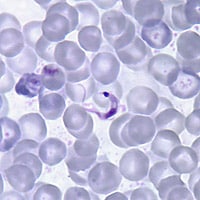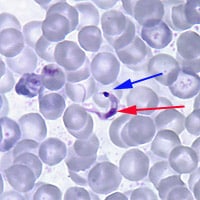
Monthy Case Studies - 2003
Case #115 - September, 2003
A female patient who received kidney and pancreas transplants from a cadaveric donor returned to the hospital with febrile illness six and a half weeks after the surgery. Recent travel outside of the US was not reported. A peripheral blood smear was prepared, stained with Giemsa, and examined. The organism in Figure A was observed on the smear. What is your diagnosis? Based on what criteria?

Figure A
Answer to Case #115
This was a case of Chagas Disease (American trypanosomiasis) caused by an infection with Trypanosoma cruzi and was acquired due to organ transplantation. Diagnostic features observed included:
- a trypomastigote of T. cruzi with an undulating membrane.
- the presence of a prominent, posteriorly-located oval kinetoplast (blue arrow) and a nucleus, usually situated in the center of the body (red arrow).
- the size of the organism, which was in the size range for T. cruzi (approximately 20 micrometers, range 12-30 micrometers).
It should be noted that Trypanosoma rangeli can also infect humans in the Americas, overlapping the geographic distribution of T. cruzi infections. However T. rangeli has a smaller kinetoplast and is usually longer and more slender (average length of 30 micrometers) than T. cruzi. There is no pathology associated with T. rangeli infections in humans.

Figure A
More on: Chagas Disease After Organ Transplantation --- United States, 2001 (MMWR)
Images presented in the monthly case studies are from specimens submitted for diagnosis or archiving. On rare occasions, clinical histories given may be partly fictitious.
 ShareCompartir
ShareCompartir


